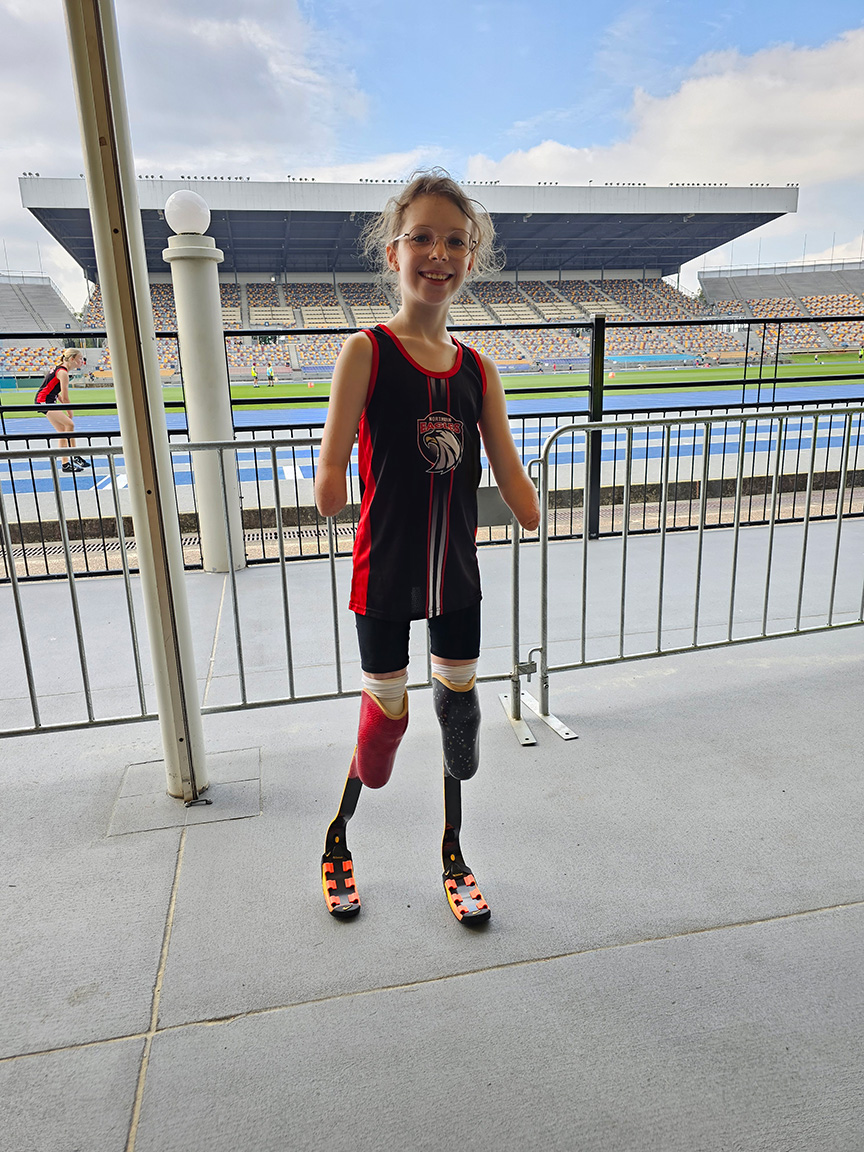
Mia became a quad-amputee due to sepsis when she was four years old. While there have been many challenging times since then, Mia has always demonstrated incredible resilience and she continues to achieve whatever she sets her mind to, all with a huge smile according to her mum Amy.
“Mia has had so many different prosthetic legs over the years, which have helped her enjoy new activities and keep up with her two siblings,” Amy said.
“Whenever she has grown out of them or has found a new activity she wants to do, her physiotherapist and prosthetist work with us to create a new set. Her new design is sunflowers and pink flowers.”
Mia’s a world away from the sick little girl who was fighting for her life in intensive care after what was initially thought to be gastro or the flu developed into sepsis. Sepsis happens when your body is fighting an infection and starts to injure its own tissues and organs. The best chance of getting better from sepsis is to treat it quickly.
“She felt sick in her stomach and vomited. We had her checked out by our local GP and again in emergency, and she was initially diagnosed with a suspected case of gastro and later as Influenza B and viral myositis,” Amy recalled.
The preschooler went home to rest and recover but her condition continued to deteriorate. Within 24 hours she was unable to focus or understand anything her parents were saying to her. She couldn’t put weight on her legs, and within 48 hours developed a light purple rash which blanched initially.
“It escalated very quickly the second time we went to the emergency department. She was rushed into intensive care and put on life support.”
Mia spent six days in intensive care, and another nine weeks in the Queensland Children’s Hospital. The infection and organ failure caused by sepsis meant she suffered extreme damage to her hands and feet, leading to the amputation of her arms and legs below the elbow and knee joints.
Since her life-threatening experience with sepsis in 2017, Mia has continued to master the use of her prostheses and build her abilities.
“Mia is still very active with her two siblings and is doing very well,” Amy said.
“She loves swimming and hydrotherapy, as well as athletics. She recently competed in the district competition for athletics, running in 100m and 200m events and came first in both.”
Outside of sport and activity, Mia loves clothes, arts and craft, and reading. She also loves singing, music, acting and dancing along with magical books and crystals.
“Mia is doing amazingly well and has continued to build up her muscle strength and balance,” Amy said.
“When she got her first set of prostheses I thought, ‘This is inconceivable that you can move in these and balance on your kneecaps and run’. But she can do it.
“It really does show how people and children can adapt. She’s continued to grow and is just as active and eager to learn as other 11-year-olds.
“Mia starts high school next year, which is very exciting. She has been accepted into the music acceleration program, playing the trombone, and singing.
“Mia continues to impress and amaze us every day. She is so determined, strong, fun, kind and cheeky.”
While Mia and her family focus on her continued recovery and growth, they are also committed to raising awareness of the signs and symptoms of sepsis.
“My advice to other parents is if your child has gastro or flu symptoms and you are worried, take them to emergency and ask, "Could this be sepsis?" Amy said.
“To parents of a child with amputations from sepsis, I would say - being Mia's Mum and a part of her post-sepsis journey as a quad-amputee, has been very emotional. There have been heartbreaking lows but also so many amazing high moments with her achievements.
“She is amazing, and we have met so many wonderful, supportive people throughout this journey.”
For families affected by sepsis, you can access support through the Queensland Paediatric Sepsis Program.